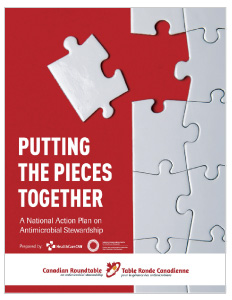This website uses cookies so that we can provide you with the best user experience possible. Cookie information is stored in your browser and performs functions such as recognising you when you return to our website and helping our team to understand which sections of the website you find most interesting and useful.
NOTE: This is an archived page and is no longer being updated. For up-to-date information on our work, please use the main navigation menu, or click here
A National Action Plan for Antimicrobial Stewardship (AMS)
HealthCareCAN continues to play a leadership role in promoting Antimicrobial Stewardship (AMS) programming and advocating for increased resources to move the needle on AMS in Canada. HealthCareCAN participated in a host of advocacy meetings with Ministers, senior civil servants, and Canada’s Chief Public Health Officer advocating for a focus on stewardship as part of a pan-Canadian approach to mitigating antimicrobial resistance. We also partnered with professional organizations and civil society to marshal resources and seed the soil for an ambitious AMS agenda in the years to come. We are hopeful that our efforts will be borne out with the release of the pan-Canadian Action Plan on Antimicrobial Resistance, which is currently slated for release in Fall 2019.
Click the button below to learn about leading practices in tackling antimicrobial resistance taking place at our member organizations.
Antimicrobial Resistance Fighters campaign
#AMResistanceFighters
As President and CEO of HealthCareCAN, I advocate to make antimicrobial stewardship a priority for our political leaders and across the continuum of care. Of the many threats we face in healthcare, antimicrobial resistance is one of the most pressing and deadliest concerns. Our leaders need to recognize this and act accordingly by making sure patients get the right drug, at the right time, at the right dose and only when necessary. We have inherited an extraordinary gift from the antimicrobial pioneers of past decade —it is time we start treating antimicrobials like the precious resources that they are. Because all of us need to be resistance fighters.
Putting the Pieces Together: A National Action Plan on Antimicrobial Stewardship
While Canada was once regarded as a global leader in recognizing and responding to the threat of antibiotic resistance, progress has lagged in recent years. HealthCareCAN and the National Collaborating Centre for Infectious Diseases collaborated together to provide policy-makers a 10 point roadmap for improving antimicrobial stewardship (AMS) in Canada, which builds on and is integrated with a number of key antimicrobial stewardship initiatives taking place in Canada and internationally.
Our 10-point roadmap for improving AMS in Canada
1
Convene and Fund a National Network to Coordinate Stewardship: “AMS Canada”
2
Nominate Executive Leads on AMS at the Federal/Provincial/Territorial Levels for Strategic Planning and Implementation
3
Enhance Accreditation for AMS
4
Support and Scale Up Core Operations in Hospital-Based AMS
5
Enhance Awareness of AMR and AMS among Prescribers and the Public
6
Establish an AMS Research and Development Fund
7
Develop and Support Core Datasets in AMU Surveillance
8
Incent Community Prescribers Using Audit and Feedback Mechanisms
9
Develop National Guidelines for Antimicrobial Prescribing and a Mechanism to Promote Adoption
10
Develop a Network of Centres of Excellence in Knowledge Mobilization (NCE-KM) for AMS
AMS Canada and the National AMS Action Plan
Learn about recent developments in the area of antimicrobial stewardship in Canada, and find out how antimicrobial use and appropriateness is being measured in Canada, what gaps which exist in our measurements, and what we can learn from other countries.
Related Reading
Antimicrobial Resistance; A Serious Public Health and Patient Safety Issue
Canadian Patient Safety Institute Submission to the House of Commons Standing Committee on Health | May 15, 2017
It’s time for Trudeau to join the battle against ‘superbugs’
The Ottawa Citizen | September 20, 2016
Driving Innovation in Healthcare - An Engine for Economic Growth and Prosperity
Speaking Notes for 2016 Pre-Budget Meeting with Minister of Finance | January 20, 2016



